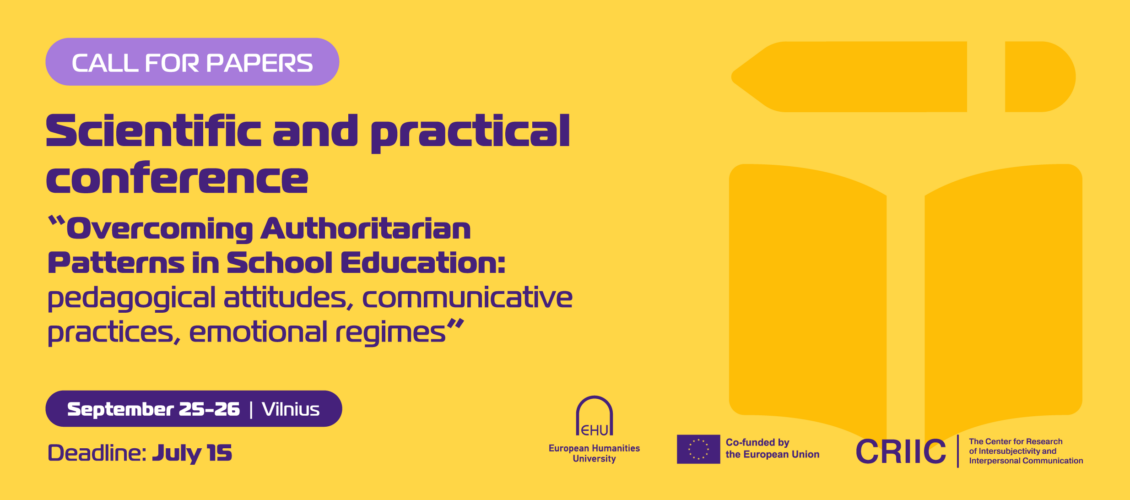Date: 25-26 September, 2024, Vilnius
Authoritarian pedagogy serves as an important tool that ensures the stability and reproduction of authoritarian regimes. A recent historical example is the Soviet secondary school, which systematically used authoritarian methods both in administration and in teaching. After the collapse of the USSR, active processes of reforming the Soviet model of education began in European post-Soviet countries at all levels, including secondary school. However, in Belarus, the liberalization and democratization of education institutions halted after Lukashenko was elected as the first president of the Republic of Belarus. As his authoritarian rule strengthened, schools in Belarus increasingly reverted to Soviet models. While private schools could offer and develop alternative approaches to educating children, the state school education system remained predominantly «Soviet» relying on Soviet institutional and pedagogical traditions.
The consequences of the aforementioned reverse tendencies became apparent after the international PISA testing in Belarus in 2018. The study revealed that Belarusian students (unlike f.ex. the Ukrainian ones) noticeably lag behind in such areas as independent thinking, ability to maintain critical distance towards received information, flexibility and variability of thinking, and imaginative capacity. The deficit of these abilities is due to the institutional and methodological peculiarities of the Belarusian school education system. The latter largely inherits from the Soviet system and under an authoritarian regime, could not develop in line with modern educational trends.
The conference is devoted to analysing authoritarian patterns in school education and ways to overcome them. By authoritarian patterns, specific patterns of violence (coercion, pressure, subjugation, etc.) are meant, which are formed under the dominance of authoritarian ideology and (re)produced through corresponding social institutions and practices. The term «patterns» refers to stable forms that the authoritarian approach takes in the behaviour and interaction of all participants in the educational process: students, teachers, administration. Some of these forms are relatively easy to recognize, while others have become so widespread and «natural» that many teachers (as well as parents of students) do not see any problem in them and do not recognize their negative impact.
The conference aims to explicate and analytically describe authoritarian patterns that define the teaching methodology, communication style, and emotional climate in schools, hindering the full development of children, creative self-realization of educators, and the formation of a culture of cooperative interaction in schools. Conducting the conference will serve as a basis for developing specific recommendations to overcome authoritarian patterns in school education in Belarus. In this regard, it would be important to consider these issues from a historical and comparative perspective – in particularly, to discuss the experience of overcoming authoritarian patterns in school education in the countries of the former «socialist bloc» (Poland, Germany/DDR, etc.) and in the post-Soviet countries (Lithuania, Ukraine, etc.).
During the conference it is proposed to discuss the following topics:
- Genesis and conditions for the reproduction of authoritarian patterns in school education.
- Authoritarian patterns in pedagogical attitudes and methods.
- Authoritarian patterns in communicative practices (teacher-student; teacher-administration; among students; among teachers).
- Emotional regimes in authoritarian schools.
- The state and school: ideological dimension of education.
- Patriarchal ideology, gender, and normalization of authoritarian patterns in school.
- Impact of the authoritarian patterns in the school system (and before – family, kindergarten) on broader society.
- Colonial/imperial backdrop of authoritarian ideology in school: experience of (post-)Soviet countries.
- The role of students in overcoming (or resisting the formation of) authoritarian patterns.
- Obstacles to fostering student’s agency in school.
- (Anti)authoritarianism and teacher’s authority (what does the teacher’s authority consist in? How is it formed?).
- Theoretical foundations of anti-authoritarian education (in philosophy, pedagogy, social theory, psychology).
- Advanced anti-authoritarian methodologies in school education.
School educators and scholars from various fields of social and humanistic knowledge (philosophy, pedagogy, sociology, anthropology, communication theory, psychology, gender studies, postcolonial studies, etc.) are invited to participate in the conference.
The conference format is hybrid: in-person + online participation.
Languages: English, Belarusian, Ukrainian.
We welcome submissions of individual papers and panel proposals. Each panel should include a moderator (the applicant) and 3-5 presenters. The moderator may also present a paper. Sections that bring together participants from different countries are especially encouraged.
To participate in the conference, please, complete the application form by July 15, 2024, using the following link.
Notifications of acceptance will be sent by August 1, 2024.
Organizing committee:
- Eglė Pranckūnienė (Lithuanian Educational Research Association, Vilnius)
- Tatiana Shchyttsova (European Humanities University, Vilnius)
- Taras Tkachuk (Vinnytsia Academy of Continuing Education, Vinnytsia)
- Stephen Webber (College of Europe, Bruges)
